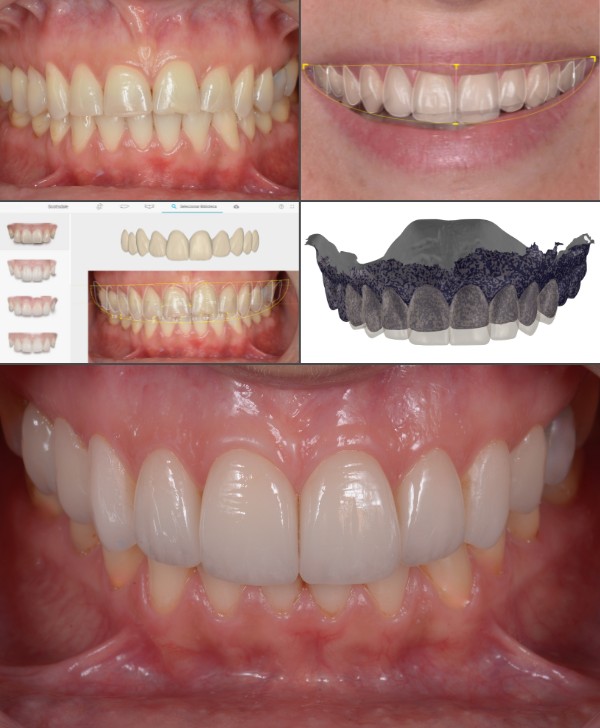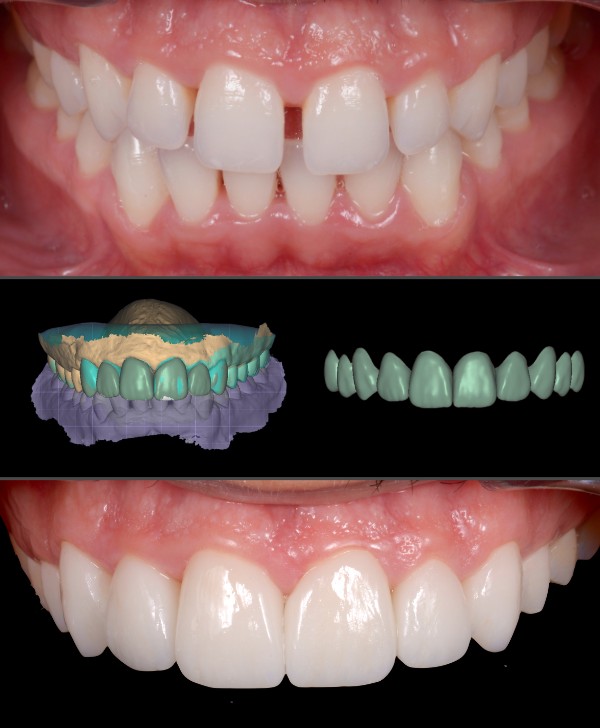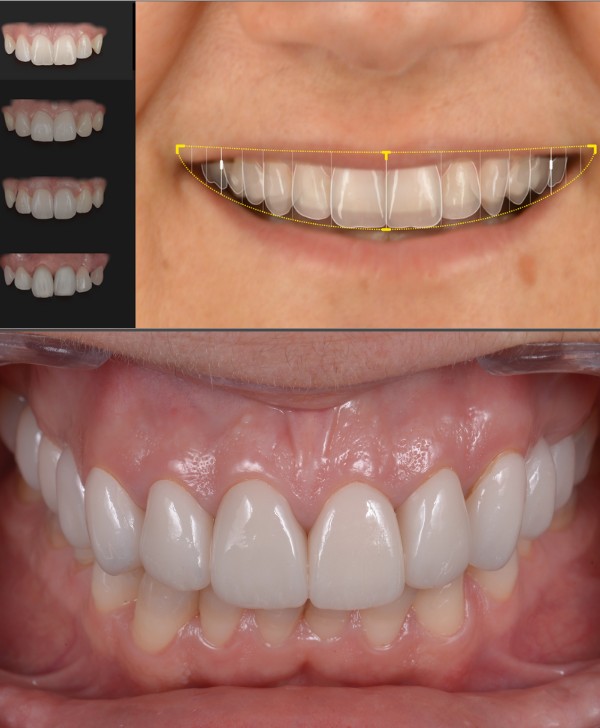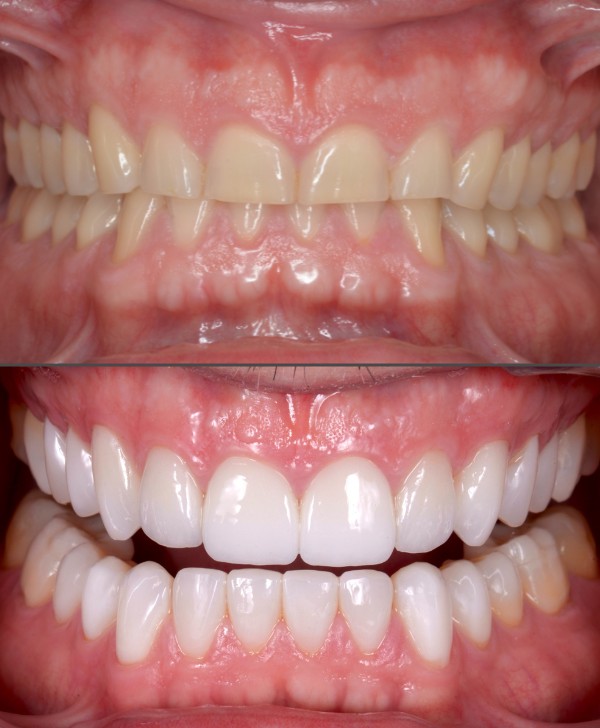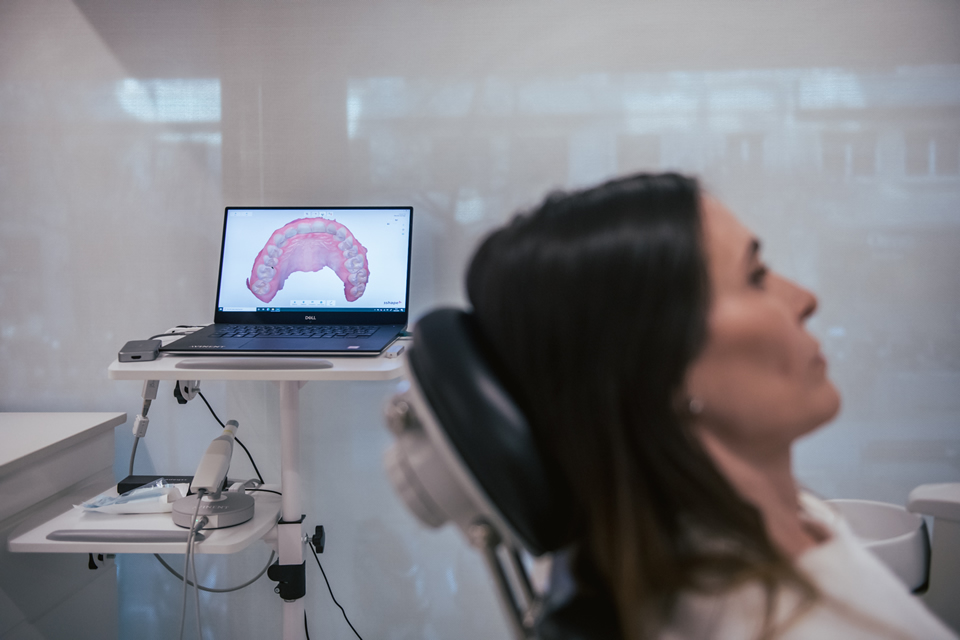
In our dental clinic in Barcelona, we have the best specialists in Oral and Dental rehabilitation. Our passion for details, together with the most accurate technology, helps us to perform a thorough work in the functional and structural reconstruction of your teeth.
Our oral and dental rehabilitation process in Barcelona
Oral rehabilitation is the dental specialty dedicated to restoring or replacing damaged teeth to restore oral function and aesthetics. At our clinic, we approach each case by combining experience with cutting-edge digital technology to offer treatments tailored to each patient’s needs.
Dental crowns and caps for oral rehabilitation
Dr. Pablo Rial and his team of dentists use cutting-edge veneers, crowns, and dental caps to restore the shape, size, and functionality of teeth damaged by wear, fractures, cavities, or malpositions.
We work with advanced digital technology. We take 3D images of your mouth and prepare the teeth for treatment with maximum precision. If necessary, we place temporary caps to protect your teeth while we design your permanent smile.
We then place your new caps and crowns, custom-made with aesthetic and highly resistant materials. Our digital system allows for a faster, safer, and more comfortable process.
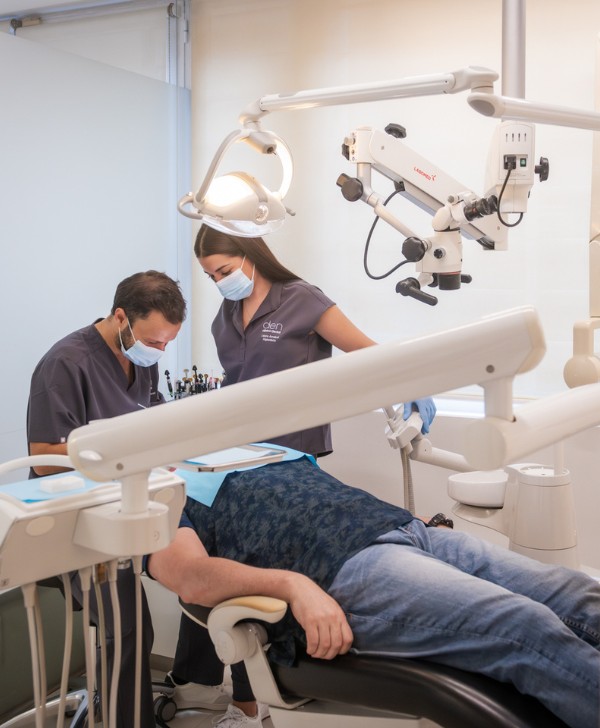
Inlays or partial crowns
We apply dental inlays, also called partial crowns, to precisely restore damaged or severely weakened back teeth.
This treatment preserves more healthy tooth structure than a traditional crown and offers a long-lasting and aesthetic solution for cases where the tooth is severely damaged, especially after a root canal.
Thanks to our digital technology, we design and place each inlay with maximum precision, restoring the function and natural shape of your back teeth. It is a safe and effective alternative to extend the life of your molars.
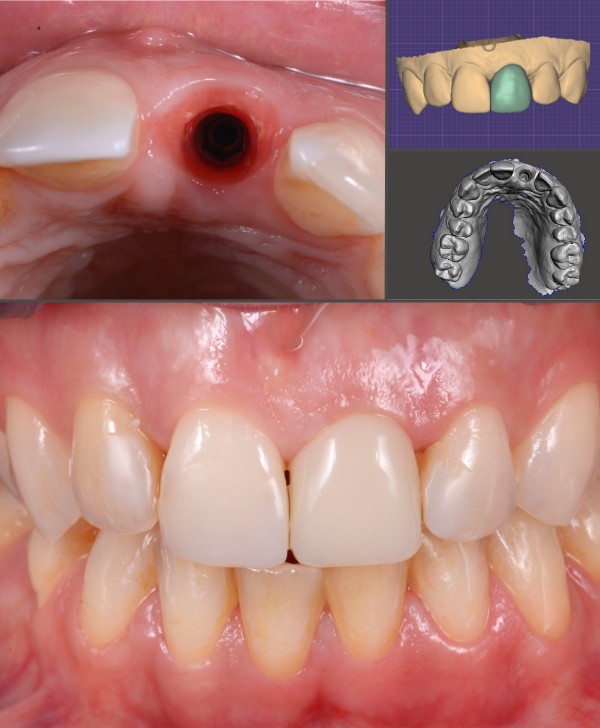
Dental implantology
When teeth are lost, implants are a key solution for oral rehabilitation. At Clínicas Den, we use high-quality implants as the basis for our crowns, bridges, and dentures.
A dental implant works like an artificial root that integrates into the bone, providing a firm and lasting hold. Our team combines digital planning, guided surgery, and customized prosthetics to achieve more natural and precise results.
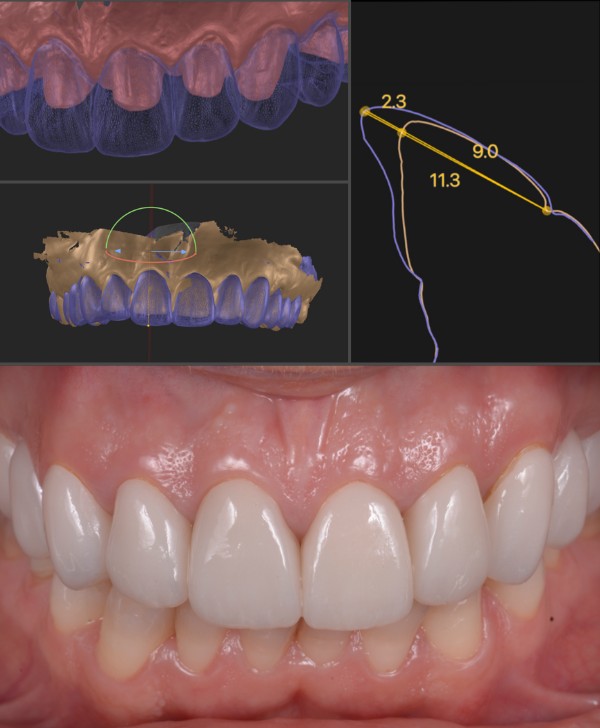
Dental prostheses and bridges
Dentures are an effective solution for restoring both chewing function and the aesthetics of your smile after tooth loss. At Clínicas Den, we offer functional and aesthetic solutions that improve your quality of life and maintain the health of your mouth.
Dental bridges allow you to replace one or more missing teeth, either on implants or supported by adjacent natural teeth. They restore chewing function and improve the aesthetics of your smile with a stable and natural result.
The principles of bioesthetics in oral rehabilitation
Bioesthetics is the dental discipline that studies the beauty of living beings in their natural forms and functions. It is a process of ongoing study that accepts the biological form as the basis for the function, diagnosis, and rehabilitation of the stomatognathic system.
Philosophy of the Department of Prosthodontics
The philosophy of the professional team led by Dr. Pablo Rial and Dr. Ramón Serrat for all dental rehabilitation treatments at our clinic in Barcelona is based on the principles of Bioesthetics, a biological model developed by the renowned prosthodontist, Dr. Lee.
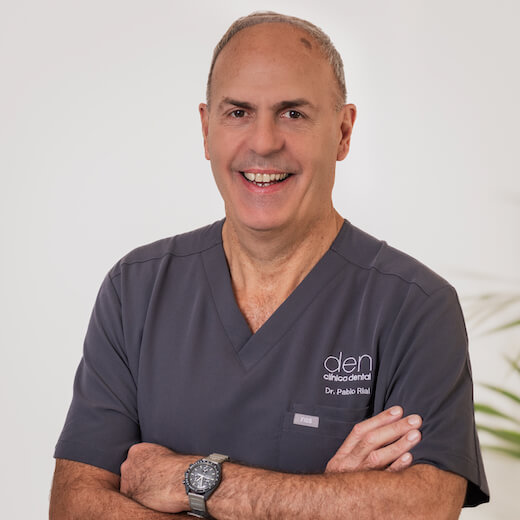
CAD/CAM (digital design and computer-aided manufacturing) system
Today, for various oral and dental rehabilitation treatments, the CAD/CAM system has represented a major evolution in dentistry. This advanced technology has succeeded in making the leap from analog to digital dentistry.
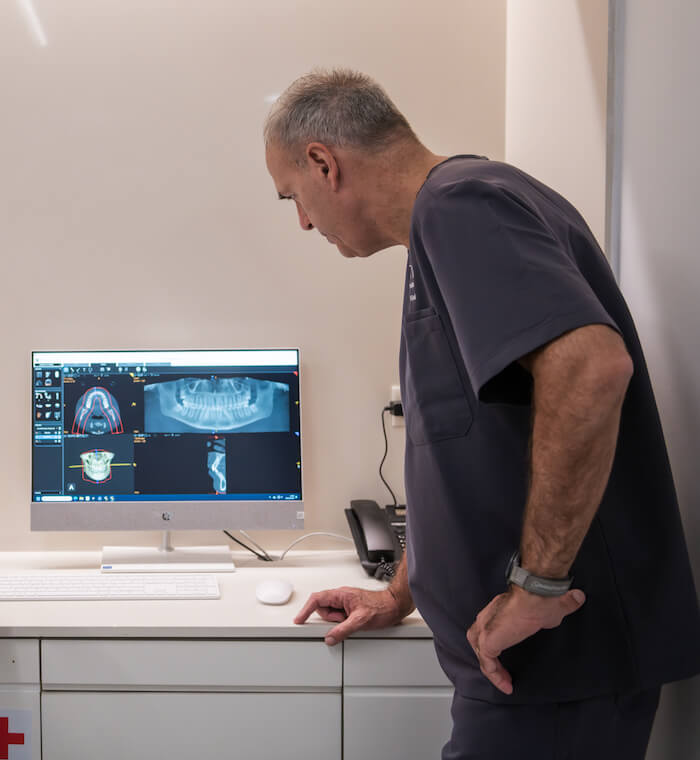
Digital design and CAD/CAM technology
We use a sophisticated CAD system, a set of 3D digital tools that help us design prostheses down to the millimeter, including crowns, veneers, and dental bridges.
And through computer-aided manufacturing (CAM), we can create these crowns or other complex implant structures from the data obtained by the digital design software.
Computer-aided digital design and manufacturing. This is undoubtedly an advanced process that provides a better fit and superior aesthetics compared to conventional methods.

Frequently asked questions about oral and dental rehabilitation
Digital smile design, what is it?
Digital smile design is an advanced technique that allows us to plan more personalized aesthetic treatments using 3D software.
Using photographs, 3D scans, and digital records, we simulate the final result of the patient’s smile before beginning treatment.
This new digital method, which we use in our Oral and Dental Rehabilitation treatments in Barcelona, facilitates communication with the patient and improves precision in each phase of the dental process.
What is better, a prosthesis on teeth or an implant?
There is no single correct answer: it depends on each patient and their clinical situation. In some cases, a dental implant is the best option. In others, a fixed prosthesis based on natural teeth is preferable.
In this case, the key is to obtain an accurate and personalized diagnosis with an oral and dental rehabilitation specialist, so that they can assess which alternative offers the greatest safety, functionality, and durability.
How long do crowns, bridges and dentures last?
In oral rehabilitation treatment, the lifespan of crowns, bridges, dentures, or crowns depends on several factors, such as the material used, the placement technique, the patient’s hygiene habits, and regular checkups.
Under optimal conditions:
- Crowns and bridges: These typically last between 10 and 20 years, although many patients manage to keep them in good condition for much longer.
- Removable prostheses: They have an average lifespan of 5 to 10 years, depending on use and care.
- Fixed prostheses supported by implants: They can last more than 20 years, and even a lifetime, if properly maintained.
In short, the average duration of these treatments is relative. However, with good hygiene and regular checkups, in addition to avoiding habits such as clenching your teeth or biting on hard objects, you can significantly extend the lifespan of any crown, bridge, or denture.
What care does a prosthesis or crown require?
Treatment with a prosthesis, bridge, crown, or crown requires care similar to that of natural teeth to ensure their durability and functionality.
Here’s a summary of the most important steps:
- Good daily hygiene: You should brush your teeth and prosthesis at least twice a day with a soft-bristled toothbrush. Use dental floss or interdental brushes to thoroughly clean between your teeth and under bridges.
- Use mouthwash: especially if you wear prostheses supported by implants or more complex structures.
- Avoid hard or sticky foods: they can damage the structure of the prosthesis or cause it to become loose.
- Don’t use your teeth as tools: Avoid opening containers or cutting things with them.
- Regular checkups with your dentist: This is essential to detect possible wear, looseness, or gum problems in a timely manner.
- Professional cleanings in the clinic: approximately every 6 months. These help maintain the health of your entire mouth and prevent infection or inflammation.
With proper maintenance, your dentures and crowns can stay in perfect condition for many more years.
Differences between veneers, crowns and dentures
When discussing the different techniques for oral rehabilitation, veneers, crowns or caps, prostheses, and bridges are not literally synonymous, although they are sometimes used interchangeably.
- Veneers: These are thin shells that cover only the front of the tooth (their main use is aesthetic).
- Crowns or caps: These are made of different materials and are used to cover the entire tooth, to reinforce it, or to restore its shape and size. They are also used in implantology.
- Bridges: These replace one or more missing teeth, supported by adjacent teeth or implants.
- Prosthesis: A term used generally, it includes any dental substitute, whether fixed or removable.
Although they have their commonalities, depending on the clinical case, each one fulfills a specific function within a dental treatment.
Can I eat normally after treatment?
Yes. After a short adjustment period, you’ll be able to chew comfortably again and enjoy your favorite foods as normal.
Who is the ideal candidate for rehabilitation?
This treatment is indicated for those who have lost several teeth, suffer significant wear, or have significant functional and aesthetic problems.
Tell us how we can help you
+34 932 18 80 80
Request information about Oral and dental rehabilitation in Barcelona
By filling the next contact form, you can communicate with the professional team at our clinic and ask for more information about our treatments as well as book an appointment with our specialists.


